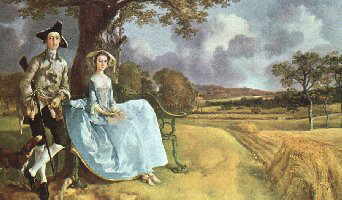
The Classical

The Classical period corresponds to the
18th century. Commonly known as the Enlightenment, the 1700's was a period
of political calm compared to the 1600's. Most of the wars which were a
product of the Reformation had ended, and many of the European countries
enjoyed a period of domestic tranquillity. This changed dramatically during
the last quarter of the century, which saw both the American and French
Revolutions.
Intellectually the period was marked by the
triumph of humanism over theology. The Middle Ages were definitely over
and most of the thinkers of the period saw mankind as being the center
of the universe. The philosophers of the period include Vico, Berkeley,
Hume and Kant. Great literature continued in the works of Defoe, Swift,
Pope, Voltaire, Fielding, Johnson, Sterne, Goldsmith, Boswell, Goethe and
Blake. Gibbon composed his grand history of the Roman Empire and Lavoisier
did for Chemistry what Newton had done for Physics. The mathematical breakthroughs
of Descartes and Newton where further developed by Euler, Lagrange and
Laplace. The most distinguishing intellectual output of the Classical Era,
however, belongs to the area of political and economic theory; in the works
of Montesquieu, Rousseau, Smith, Burke, Bentham and the Federalist Papers.
This should not be a surprise for an era that also produced two of history's
most important political revolutions.

THE 18TH CENTURY
THE RISE OF THE NOVEL
DANIEL DEFOE. “Robinson
Crusoe”.
We
are going to observe a writer but is not a novelist. He had many jobs during
his life: manufacturer, journalist (he wrote several collaborations for
journals), etc.
Just
with sixteen years old, he wrote a book called Robinson Crusoe. Some scholars
argue that it is the first novel, but others say the novel came with Richardson’s
Pamela.
Robinson
Crusoe is an account of someone called Robinson Crusoe. It is incredible
his life in an island. There is realistic detail that convince us.
It
is a book of travels. he has strange and interesting adventures in that
island.
It
is an invented story by Daniel Defoe. He was just writing a kind of journalistic
story about someone that had surprising adventures. And it is based in
a real event. He took that real story from two stories and invented another
one. He was not concienstly writing a novel, but writing a story as journalistic.
What Defoe is doing is writing a story about two mariners: Selkirk and
Dampier. Defoe convinces us that it is a real story, but in fact is an
invented one. This book is presented as an autobiographical account of
a mariner. It is a kind of book of travels (Travel book). How Defoe manage
to convince us that is real? There is such an interest in everyday tasks.
There is such an amount of details that the reader can be identified with
Robinson Crusoe. Robinson Crusoe tries to live a normal life in an island.
There is a space for religious preoccupations. He is preoccupied with God;
he does evocations to the Providence of his life. Actually, we might find
Robinson Crusoe as a preaching book, as a novel buff. He lost his Fe, but
after some circumstances he recovered his Fe in God, in the Providence.
Importance of the religious experience. Connection between the character
Robinson Crusoe and God: the Bible. The Bible helps him to recover the
Fe. He found some comfort on it. We can observe Robinson Crusoe as an example
of Puritan Fe.
Defoe
is an Englishman of middle-class; he had a lot of business experiences.
He was an entrepreneur, self-confident, empirical, etc. He had material
success in life connected with his condition of puritan. The success in
business is connected with God.
He
is almost the prototype of a dominant figure of the middle-class Englishman,
capitalist.
The
protestant ethic and spirit of catholic: it is an analysis by Weber. He
observed that Puritanism is an impulse in modern Catholicism. The success
of material life is a sign that God is inside. Protestant Europe was successful
thanks to God. There is a number of writers that consider Robinson Crusoe
as a reflect of middle-class successful thanks to God.
Crusoe
is just a hero that the only thing he looks for is security and comfort
in a desert island.
Crusoe
is the image of the capitalist idea; he is a self-mademan. Critics that
look at literature from this sociological perspective and even from the
philosopher Karl Marx observe that the novel is a literature form that
reflects the middle-class ideology.
Crusoe
is a very commercial man, he thinks in a commercial way. Sometimes there
is a connection between religious terms and commercial ones, and sometimes
produces irony, but Defoe is not award of.
The
capitalist life implies a solitary life and a commercial life too, of course.
Crusoe
is just a journalist account and a trade man, a trade man that reconstructs
his own civilization with his own hands.
The
language is ordinary, plain style. Writing by himself. Middle-class language
that helps to give that impression of realism. Crusoe is an ordinary man.
It
is written by himself: it is a retrospective and first person narration.
The narrator is Robinson, but adult. He is able to tell us his own life
from the perspective of Robinson Crusoe as a young man. The story is focalised
in him. The novel is able to produce that mixture between the adult Crusoe
and the young Crusoe.
In
Robinson Crusoe we find a character we can identify with. Robinson Crusoe
is universal, representative.
TAYLOR:
“Crusoe is the universal representative, the person for whom every reader
could substitute himself”.
Crusoe
does not look for any heroic idea, not for excellence, but for survive.
Academic
Year 00-01
07/02/2001
©a.r.e.a.
Dr. Vicente Forés López
©Ana
Aroa Alba Cuesta
Universitat
de València Press

![]()